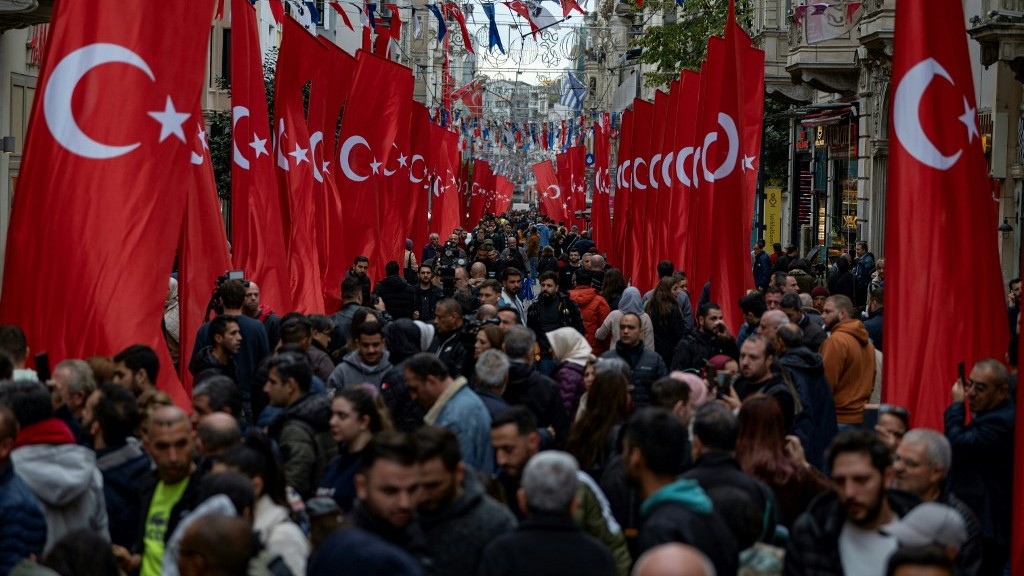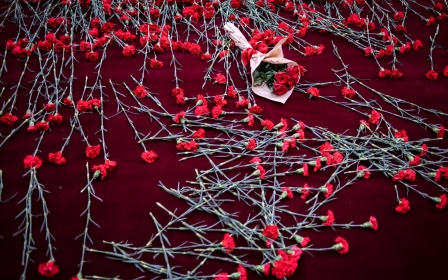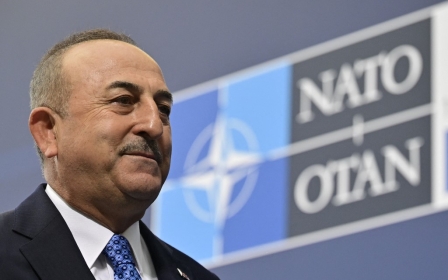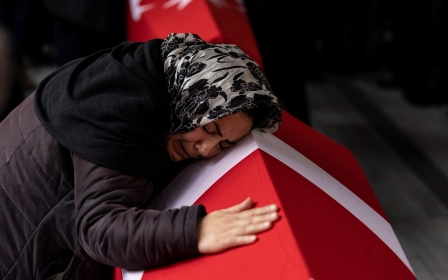Istanbul bombing: How a bustling day in Taksim turned to horror and grief
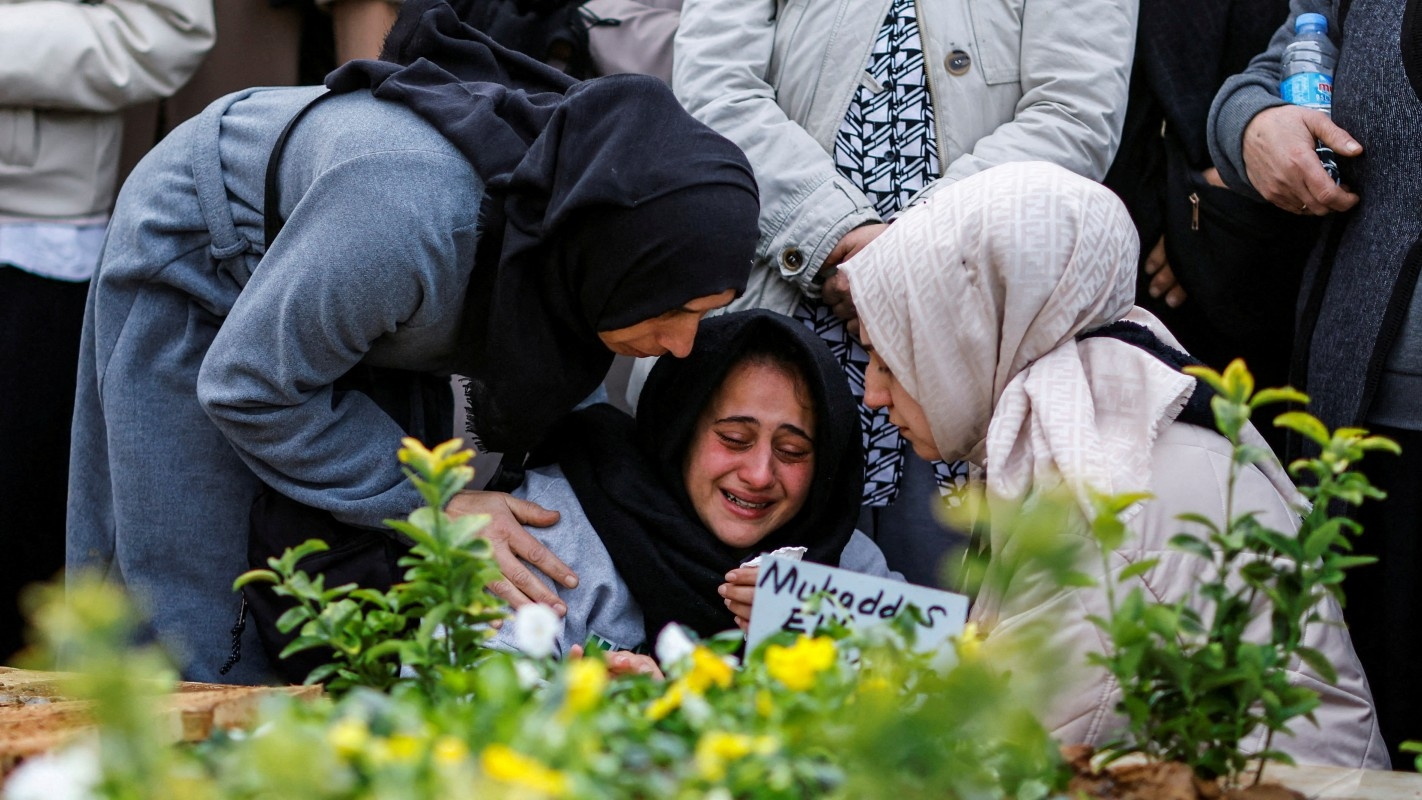
Sunday 13 November was a sunny day in the popular shopping and dining destination of Istiklal Avenue. It was as busy as usual, packed with thousands of locals and tourists enjoying the shops, cafes and restaurants of the historic Beyoglu neighborhood.
Then a bomb detonated.
"We didn't understand what exactly happened. We saw a light or fire coming out of nowhere. Then there was dust, stones, shards of glass. We ran in panic," one eyewitness who was having tea with friends in a nearby cafe told Middle East Eye.
Shortly after the explosion and the initial panic, the bodies of six people, including two minors, were lying on the ground in pools of blood.
'When I saw wounded people, I was shocked. I didn't know what to do, run away or try to help them. We are still in fear'
- Simit seller in Istiklal Avenue
The bright Sunday turned into a day of horror after an assailant left a bomb-laden bag over a bench, situated in the middle of the Avenue.
Turkey's Interior Minister Suleyman Soylu has accused the Kurdistan Workers' Party (PKK) armed group of responsibility for the bombing.
The PKK on Monday denied responsibility for the attack and no group has so far claimed it.
Istanbul police say 46 people have been arrested over the attack, including a woman suspected of having planted the bomb.
The police said Ahlam Albashir is a Syrian national and that she had confessed to being trained by the PKK.
Footage released by the Istanbul police appeared to show that Albashir had a gun and some ammunition at her residence, along with a considerable amount of cash and some gold.
Soylu said on Monday morning in a live television interview from Istiklal Avenue, where the bombing hit, that if Albashir had not been arrested she could have escaped to Greece.
The minister also said that authorities had a phone tap showing that the PKK had ordered Albashir's killing after the attack and that authorities had arrested the person sent to kill her.
'I heard people's screams'
Hassan, an American national of Iranian origin had arrived in Istanbul one day before the attack to meet some of his relatives there.
"I passed the area where the bomb exploded perhaps 10 minutes before to get to my hotel, which was barely 100 meters away," he told MEE.
"I got in my room to change my clothes. Then I heard the sound, the windows were shaken. I think some windows in other buildings were shattered. I heard people's screams. They were running down to the Tarlabasi Avenue. As I'm a photographer, I ran into the area to take some photos, but the plainclothes policemen asked me to move away in case another bomb would explode."
A simit seller who was also in the area told MEE that he was a few metres away from the site of the explosion.
"Luckily nothing serious happened to me, but it affected my ears. I still have difficulty hearing. When I saw wounded people, I was shocked. I didn't know what to do; whether I should run away or try to help them. I was paralysed. We are still in fear.”
Turkish journalist, Nagihan Alci, was walking in the Avenue with her kids when the attack hit.
"We were in a store in the shopping mall in front of which the bomb exploded 20 minutes before the explosion," she wrote in her column in Haberturk daily. "The avenue was so crowded that we could barely walk. After getting ice cream for my daughters, we turned left to leave the Avenue. It was the moment when we heard the explosion. The rest was pure chaos, confusion. So, we unknowingly saved ourselves by 20 minutes and 200 meters."
A couple who died in the attack, Adem Topkara and Mukaddes Elif Topkara, had left their two-year-old daughter with her aunt who works in Taksim. The couple went to Istiklal Avenue for a walk when the bomb set off.
Arzu Ozsoy and her 15-year-old daughter Yagmur Ucar, who lost their lives in the bombing, were also in Taksim for a day out.
Yusuf Meydan lost his life along with his nine-year-old daughter Ecrin in the attack. He had traveled from Adana to Istanbul to attend his brother's engagement ceremony, and wanted to make a final stop in Taksim before heading home, according to his cousin who spoke to Anadolu Agency.
Foreign journalist Shelly Kittleson was near the Avenue and witnessed the immediate aftermath. "Multiple bodies were lying on the ground after the explosion. Police immediately began cordoning off the surrounding area as ambulance sirens squealed and a low-flying helicopter looped overhead," she wrote.
Having suffered from repeated PKK and IS attacks in the past decade, Turks are again fearful of a new era of more terror operations in their country.
A shopkeeper standing in front of his shop voiced his anger as he saw pedestrians speak with MEE. After having a sip from his morning tea, he asked: "What the hell do they think they are doing? Why do they kill people? What will they gain?"
Another man passing by stopped and consoled the shopkeeper: "Don't despair; we'll win over them."
Middle East Eye propose une couverture et une analyse indépendantes et incomparables du Moyen-Orient, de l’Afrique du Nord et d’autres régions du monde. Pour en savoir plus sur la reprise de ce contenu et les frais qui s’appliquent, veuillez remplir ce formulaire [en anglais]. Pour en savoir plus sur MEE, cliquez ici [en anglais].


